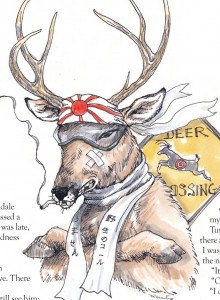“I hit a fox last night.”
I told Rita this as we drove up Lawndale Drive toward Summerfield, just after we’d passed a small carcass on the side of the road. It was late, the streets empty, the air filled with the sweet sadness of a fleeting summer night.
“It dashed in front of my car, out of nowhere,” I said. “There was nothing I could do!” He ran toward death like a kamikaze pilot. I could still see him; hear that sound. “Maybe I saved someone’s chickens by hitting it.” This happened in rural-ish Oak Ridge, in the northwest part of Guilford County.
“Maybe.”
Then I felt bad I’d brought up the incident. Rita and I had just indulged in an overdue Girls Night Out at The Bistro at Adams Farm. Glorious wine from thousands of miles away accompanied my pan-seared duck breast over sweet potato, fig and walnut ravioli. The duck was tossed in a whole grain mustard and maple cream sauce and topped with candied walnuts. Truly a meal that transports you. Here I was talking about dead animals.
Rita’s voice shifted into a reflective state. “I hit a deer one afternoon when I was picking my girls up from school. Right on this road. I was crying, the girls were crying. Then a beat-up pick-up truck appeared. A woman got out, looked over the deer, and declared, ‘Got yerself a nice-un.’ She gave me a big smile. Her teeth were brown from smoking or chewing tobacco. She was probably fifty but looked older. Still sobbing, I said to her, ‘I don’t know what to do. Is there someone I should call?’ The woman’s head jerked up. ‘Ya mean ya ain’t keepin’ it?!’”
When Rita made it clear that wasn’t her intention, she said, “I’ll git my son. We’ll take care of it.”
Turning on Lake Brandt Road, I said, “I know there are people who scout for roadkill to eat. I was surprised the fox was still there the next day.”
“It gets worse.”
“Oh, no.”
“I drove by later and there was the deer strung upside down to a telephone pole with its insides gone. You have to let the blood drain right away or it’ll taste too gamey.”
“Is that legal? On a public street.”
“I guess here it is.”
I let that image sink in, and the fact that offal sounds a lot like awful.
I said, “A friend told me he saw some Latino workers chase a groundhog that was in a field. They stuffed it in their ice chest to eat later.”
We simultaneously said, “What does groundhog tastes like?”
Nothing like that duck I’d just had, I’m sure.
Rita told me someone she knew was invited to a Cinco de Mayo party at a park in Winston-Salem two years ago. “They brought in a live cow and slaughtered it, right there in the park. They said it was cheaper than buying the meat.”
Again I wondered if that was legal. Then I thought why shouldn’t it be?
As we drove on it occurred to me that with all that technology has done to create a global village there are still plenty of sharp cultural edges firmly rooted in a time long forgotten by most Americans. The woman in the pick-up truck went and got her son. She didn’t whip out her cell phone.
Though butcher shops may be a rarity now, how you cut up an animal hasn’t changed one bit. Not that I would know what to do. I would have to google it.
A version of this essay originally appeared in the August 2012 issue of O. Henry magazine.
